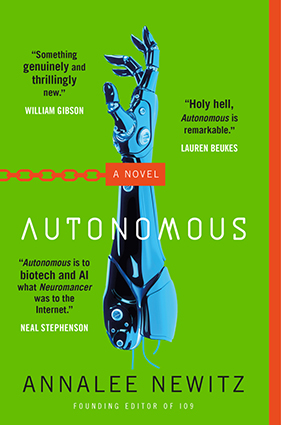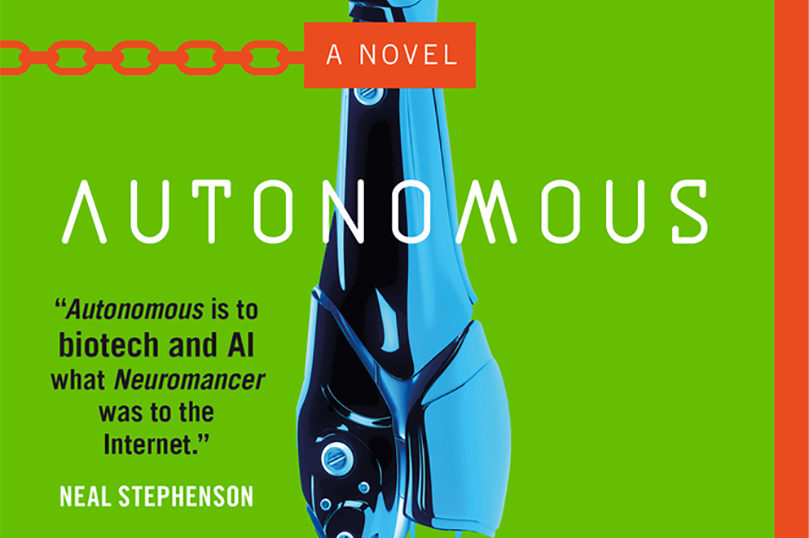 Earth, 2144. Jack is an anti-patent scientist turned drug pirate, traversing the world in a submarine as a pharmaceutical Robin Hood, fabricating cheap scrips for poor people who can’t otherwise afford them. But her latest drug hack has left a trail of lethal overdoses as people become addicted to their work, doing repetitive tasks until they become unsafe or insane.
Earth, 2144. Jack is an anti-patent scientist turned drug pirate, traversing the world in a submarine as a pharmaceutical Robin Hood, fabricating cheap scrips for poor people who can’t otherwise afford them. But her latest drug hack has left a trail of lethal overdoses as people become addicted to their work, doing repetitive tasks until they become unsafe or insane.
Hot on her trail, an unlikely pair: Eliasz, a brooding military agent, and his robotic partner, Paladin. As they race to stop information about the sinister origins of Jack’s drug from getting out, they begin to form an uncommonly close bond that neither of them fully understand.
And underlying it all is one fundamental question: Is freedom possible in a culture where everything, even people, can be owned?
The paperback edition of Autonomous will become available September 4th. Please enjoy this excerpt.
One: Pirate Ship
June 25, 2144
The student wouldn’t stop doing her homework, and it was going to kill her. Even after the doctors shot her up with tranquilizers, she bunched into a sitting position, fingers curled around an absent keyboard, typing and typing. Anti-obsessives had no effect. Tinkering with her serotonin levels did nothing, and the problem didn’t seem to be dissociation or hallucination. The student was perfectly coherent. She just wouldn’t stop reimplementing operating system features for her programming class. The only thing keeping her alive was a feeding tube the docs had managed to force up her nose while she was in restraints.
Her parents were outraged. They were from a good neighborhood in Calgary, and had always given their daughter access to the very best pharma money could buy. How could anything be going wrong with her mind?
The doctors told reporters that this case had all the hallmarks of drug abuse. The homework fiend’s brain showed a perfect addiction pattern. The pleasure-reward loop, shuttling neurotransmitters between the midbrain and cerebral cortex, was on fire. This chemical configuration was remarkable because her brain looked like she’d been addicted to homework for years. It was completely wired for this specific reward, with dopamine receptors showing patterns that normally emerged only after years of addiction. But the student’s family and friends insisted she’d never had this problem until a few weeks ago.
It was the perfect subject for a viral nugget in the medical mystery slot of the All Wonders feed. But now the story was so popular that it was popping up on the top news modules, too.
Jack Chen unstuck the goggles from her face and squeezed the deactivated lenses into the front pocket of her coveralls. She’d been working in the sun’s glare for so long that pale rings circled her dark brown eyes. It was a farmer’s tan, like the one on her father’s face after a long day wearing goggles in the canola fields, watching tiny yellow flowers emit streams of environmental data. Probably, Jack reflected, the same farmer’s tan had afflicted every Chen for generations. It went back to the days when her great-great-grandparents came across the Pacific from Shenzhen and bought an agricultural franchise in the prairies outside Saskatoon. No matter how far she was from home, some things did not change.
But some things did. Jack sat cross-legged in the middle of the Arctic Sea, balanced on the gently curving, uncanny invisibility of her submarine’s hull. From a few hundred kilometers above the surface, where satellites roamed, the sub’s negative refractive index would bend light until Jack seemed to float incongruously atop the waves. Spread next to her in the bright water was an undulating sheet of nonreflective solar panels. Jack made a crumpling gesture with her hand and the solar array swarmed back into its dock, disappearing beneath a panel in the hull.
The sub’s batteries were charged, her network traffic was hidden in a blur of legitimate data, and she had a hold full of drugs. It was time to dive.
Opening the hatch, Jack banged down the ladder to the control room. A dull green glow emerged in streaks on the walls as bacterial colonies awoke to illuminate her way. Jack came to a stop beneath a coil of ceiling ducts. A command line window materialized helpfully at eye level, its photons organized into the shape of a screen by thousands of projectors circulating in the air. With a swipe, she pulled up the navigation system and altered her heading to avoid the heavily trafficked shipping lanes. Her destination was on a relatively quiet stretch of the Arctic coast, beyond the Beaufort Sea, where freshwater met sea to create a vast puzzle of rivers and islands.
But Jack was having a hard time concentrating on the mundane tasks at hand. Something about that homework-addiction story was bugging her. Mashing the goggles over her eyes again, she reimmersed in the feed menu. Glancing through a set of commands, she searched for more information. “HOMEWORK FIEND CASE REEKS OF BLACK-MARKET PHARMA,” read one headline. Jack sucked in her breath. Could this clickbait story be about that batch of Zacuity she’d unloaded last month in Calgary?
The sub’s cargo hold was currently stacked with twenty crates of freshly pirated drugs. Tucked among the many therapies for genetic mutations and bacterial management were boxes of cloned Zacuity, the new blockbuster productivity pill that everybody wanted. It wasn’t technically on the market yet, so that drove up demand. Plus, it was made by Zaxy, the company behind Smartifex, Brillicent, and other popular work enhancement drugs. Jack had gotten a beta sample from an engineer at Vancouver’s biggest development company, Quick Build Wares. Like a lot of biotech corps, Quick Build handed out new attention enhancers for free along with their in-house employee meals. The prerelease ads said that Zacuity helped everyone get their jobs done faster and better.
Jack hadn’t bothered to try any Zacuity herself—she didn’t need drugs to make her job exciting. The engineer who’d provided the sample described its effects in almost religious terms. You slipped the drug under your tongue, and work started to feel good. It didn’t just boost your concentration. It made you enjoy work. You couldn’t wait to get back to the keyboard, the breadboard, the gesture table, the lab, the fabber. After taking Zacuity, work gave you a kind of visceral satisfaction that nothing else could. Which was perfect for a corp like Quick Build, where new products had tight ship dates, and consultants sometimes had to hack a piece of hardware top-to-bottom in a week. Under Zacuity’s influence, you got the feelings you were supposed to have after a job well done. There were no regrets, nor fears that maybe you weren’t making the world a better place by fabricating another networked blob of atoms. Completion reward was so intense that it made you writhe right in your plush desk chair, clutching the foam desktop, breathing hard for a minute or so. But it wasn’t like an orgasm, not really. Maybe it was best described as physical sensation, perfected. You could feel it in your body, but it was more blindingly good than anything your nerve endings might read as inputs from the object-world. After a Zacuity-fueled work run, all you wanted to do was finish another project for Quick Build. It was easy to see why the shit sold like crazy.
But there was one little problem, which she’d been ignoring until now. Zaxy didn’t make data from their clinical trials available, so there was no way to find out about possible side effects. Normally Jack wouldn’t worry about every drug freak-out reported on the feeds, but this one was so specific. She couldn’t think of any other popular substances that would get someone addicted to homework. Sure, the student’s obsessive behavior could be set off by a garden-variety stimulant. But then it would hardly be a medical mystery, since doctors would immediately find evidence of the stimulant in her system. Jack’s mind churned as if she’d ingested a particularly nasty neurotoxin. If this drug was her pirated Zacuity, how had this happened? Overdose? Maybe the student had mixed it with another drug? Or Jack had screwed up the reverse engineering and created something horrific?
Jack felt a twitch of fear working its way up her legs from the base of her spine. But wait—this shiver wasn’t just some involuntary, psychosomatic reaction to the feeds. The floor was vibrating slightly, though she hadn’t yet started the engines. Ripping off the goggles, she regained control of her sensorium and realized that somebody was banging around in the hold, directly behind the bulkhead in front of her. What the actual fuck? There was an aft hatch for emergencies, but how—? No time to ponder whether she’d forgotten to lock the doors. With a predatory tilt of the head, Jack powered up her perimeter system, its taut nanoscale wires networked with sensory nerves just below the surface of her skin. Then she unsnapped the sheath on her knife. From the sound of things, it was just one person, no doubt trying to grab whatever would fit in a backpack. Only an addict or someone truly desperate would be that stupid.
She opened the door to the hold soundlessly, sliding into the space with knife drawn. But the scene that met her was not what she expected. Instead of one pathetic thief, she found two: a guy with the scaly skin and patchy hair of a fusehead, and his robot, who was holding a sack of drugs. The bot was some awful, hacked-together thing the thief must have ripped off from somebody else, its skin layer practically fried off in places, but it was still a danger. There was no time to consider a nonlethal option. With a practiced overhand, Jack threw the knife directly at the man’s throat. Aided by an algorithm for recognizing body parts, the blade passed through his trachea and buried itself in his artery. The fusehead collapsed, gagging on steel, his body gushing blood and air and shit.
In one quick motion, Jack yanked out her knife and turned to the bot. It stared at her, mouth open, as if it were running something seriously buggy. Which it probably was. That would be good for Jack, because it might not care who gave it orders as long as they were clear.
“Give me the bag,” she said experimentally, holding her hand out. The sack bulged with tiny boxes of her drugs. The bot handed it over instantly, mouth still gaping. He’d been built to look like a boy in his teens, though he might be a lot older. Or a lot younger.
At least she wouldn’t have to kill two beings today. And she might get a good bot out of the deal, if her botadmin pal in Vancouver pitched in a little. On second glance, this one’s skin layer didn’t look so bad, after all. She couldn’t see any components peeking through, though he was scuffed and bloody in places.
“Sit down,” she told him, and he sat down directly on the floor of the hold, his legs folding like electromagnetically joined girders that had suddenly lost their charge. The bot looked at her, eyes vacant. Jack would deal with him later. Right now, she needed to do something with his master’s body, still oozing blood onto the floor. She hooked her hands under the fusehead’s armpits and pulled his remains through the bulkhead door into the control room, leaving the bot behind her in the locked hold. There wasn’t much the bot could do in there by himself, anyway, given that all her drugs were designed for humans.
Down a tightly coiled spiral staircase was her wet lab, which doubled as a kitchen. A high-grade printer dominated one corner of the floor, with three enclosed bays for working with different materials: metals, tissues, foams. Using a smaller version of the projection display she had in the control room, Jack set the foam heads to extrude two cement blocks, neatly fitted with holes so she could tie them to the dead fusehead’s feet as easily as possible. As her adrenaline levels came down, she watched the heads race across the printer bed, building layer after layer of matte-gray rock. She rinsed her knife in the sink and resheathed it before realizing she was covered in blood. Even her face was sticky with it. She filled the sink with water and rooted around in the cabinets for a rag.
Loosening the molecular bonds on her coveralls with a shrug, Jack felt the fabric split along invisible seams to puddle around her feet. Beneath plain gray thermals, her body was roughly the same shape it had been for two decades. Her cropped black hair showed only a few threads of white. One of Jack’s top sellers was a molecule-for-molecule reproduction of the longevity drug Vive, and she always quality-tested her own work. That is, she had always quality tested it—until Zacuity. Scrubbing her face, Jack tried to juggle the two horrors at once: A man was dead upstairs, and a student in Calgary was in serious danger from something that sounded a lot like black-market Zacuity. She dripped on the countertop and watched the cement blocks growing around their central holes.
Jack had to admit she’d gotten sloppy. When she reverse engineered the Zacuity, its molecular structure was almost exactly like what she’d seen in dozens of other productivity and alertness drugs, so she hadn’t bothered to investigate further. Obviously she knew Zacuity might have some slightly undesirable side effects. But these fun-time worker drugs subsidized her real work on antivirals and gene therapies, drugs that saved lives. She needed the quick cash from Zacuity sales so she could keep handing out freebies of the other drugs to people who desperately needed them. It was summer, and a new plague was wafting across the Pacific from the Asian Union. There was no time to waste. People with no credits would be dying soon, and the pharma companies didn’t give a shit. That’s why Jack had rushed to sell those thousands of doses of untested Zacuity all across the Free Trade Zone. Now she was flush with good meds, but that hardly mattered. If she’d caused that student’s drug meltdown, Jack had screwed up on every possible level, from science to ethics.
With a beep, the printer opened its door to reveal two perforated concrete bricks. Jack lugged them back upstairs, wondering the entire time why she had decided to carry so much weight in her bare hands.
Copyright © 2017 by Annalee Newitz
Order Your Copy











